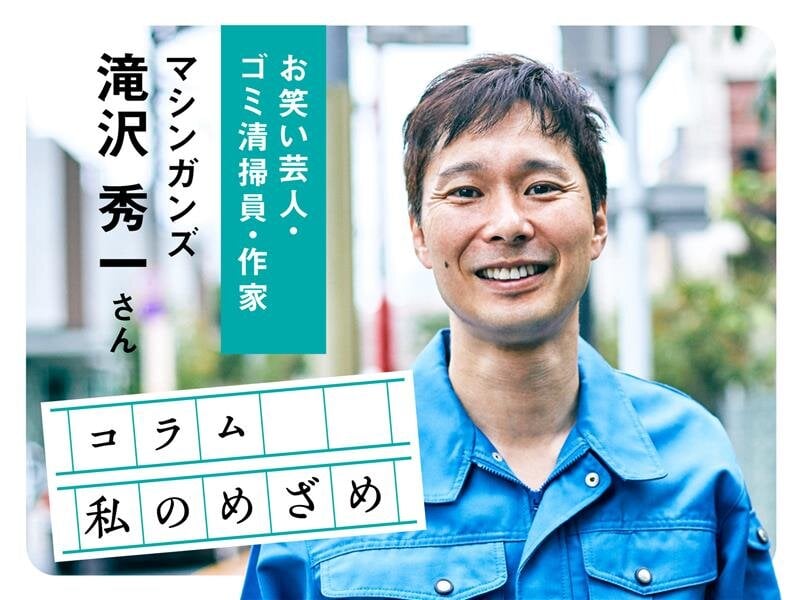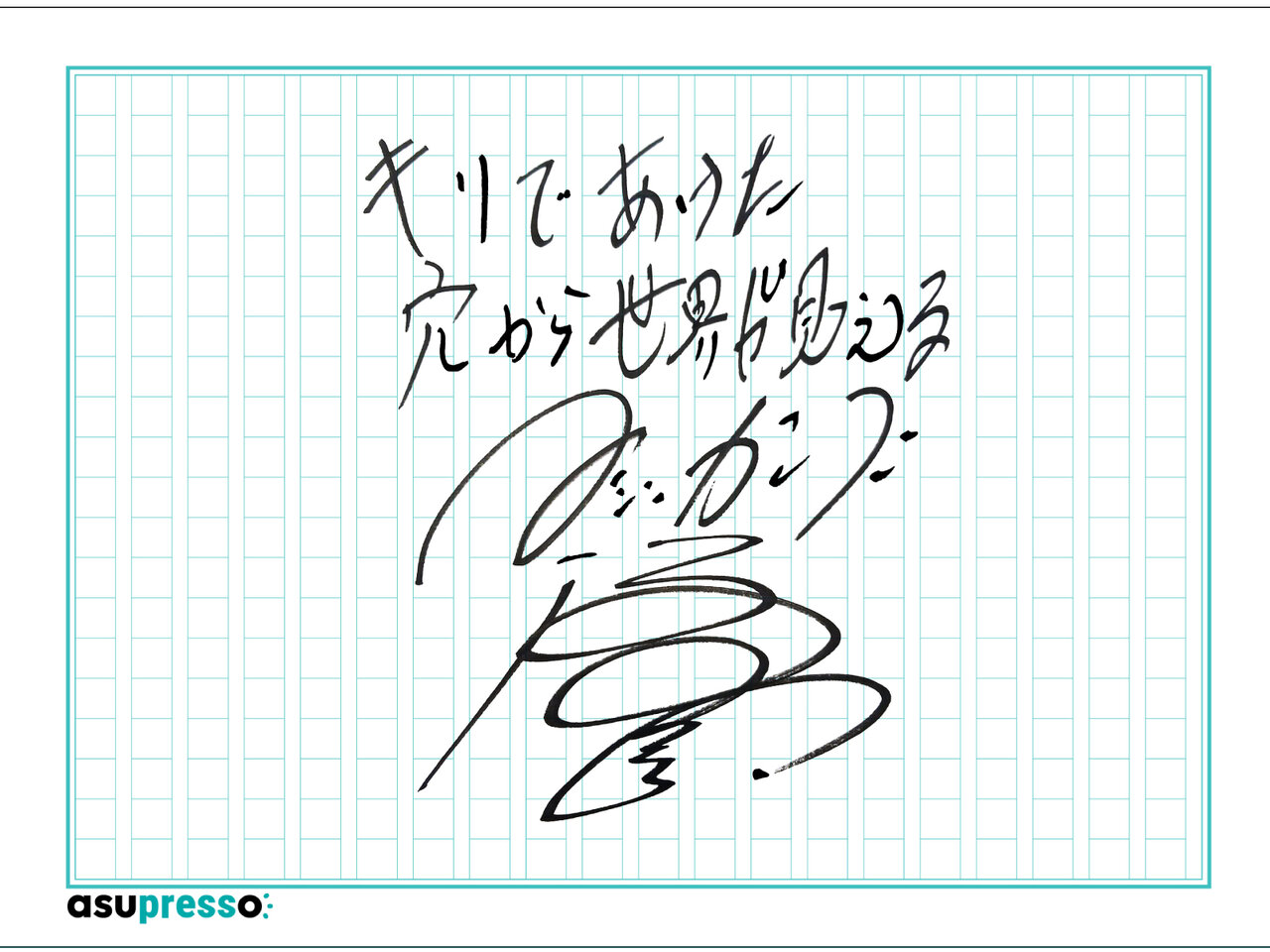
Shuichi Takizawa’s “My Awakening”: The World I Saw Through the “Hole” as a Garbage Collector
Everyone has their own "moment of awakening." In this series, "My Awakening" brought to you by "Asupresso," we support the infinite potential of these moments. We invite special guests each time to share their memories and thoughts related to their "awakenings." This time, our guest is Shuichi Takizawa, a comedian who also works as a garbage collector.
Shuichi Takizawa (Comedian, Garbage Collector)
Born in 1976 in Tokyo. Formed the comedy duo Machine Guns with Ryo Nishibori in 1998, gaining recognition through competitions like M-1 Grand Prix and THE MANZAI. In 2012, he began working for a waste collection company while continuing his career as a comedian. Drawing from his experience, he shares information on waste issues through social media, books, and lectures, and also serves as a sustainability ambassador for Japan’s Ministry of the Environment. Author of “This Garbage Cannot Be Collected: Unbelievable Scenes Seen by a Garbage Collector (Byakuya Shobo)”, etc.
"Focus on one point until you break through — and you’ll see the world beyond."
My writing mentor once told me:
“Takizawa-san, you have so much you want to say that it’s hard for readers to focus. Please remember this: in one book, you can only truly convey one main thing. What will you focus on? Like drilling a hole with an awl, choose one spot and focus on it with all your strength. Once the hole is made, you’ll be able to see the world through it.”
Those words struck me deeply — because I knew exactly what they meant. When you try to say everything, you end up confusing your audience. My mentor was telling me to convey one thing sincerely. And the idea that “you’ll be able to see the world through it” really resonated with me.
So, what’s the one thing I’ve pursued with intensity?
Looking back on my life, the one thing I’ve been almost obsessed with is reducing waste. That’s because, since I was 36, I’ve been working not only as a comedian but also as a garbage collector. I know a little more about garbage than most people, so here’s something I’ve noticed that I’ll share with you.
Could Copying Rich People’s Trash Habits Make You Rich?
While collecting garbage, I came up with a theory:
“If you reduce waste, maybe you could become rich.”
You don’t have to believe me — it’s just something I thought and acted on myself. To this day, I still believe it and keep reducing my own waste.
In my job, I collect trash in all kinds of neighborhoods — from ordinary residential areas like where most of us live, to upscale districts with sprawling mansions that make your jaw drop. And the higher the land prices, the less garbage there is. Why is that? The answer came to me quickly.
When I first started the job, 100-yen shops were booming, and in ordinary neighborhoods, I’d see huge amounts of their products in the trash — bowls, glasses, toys, plastic containers — all still perfectly usable. People throwing them out probably didn’t think much of it, but from my perspective as a garbage collector, I thought, “They’re spending money to buy garbage.”
And in high-end neighborhoods? I almost never saw 100-yen shop items in the trash. It’s rare to even see those stores nearby. These days, I don’t see as many 100-yen shop products in the trash from most neighborhoods — but even so, the amount of trash from ordinary areas hasn’t really changed.
Today, what I see most in the trash is clothing. Clothes have become shockingly cheap in recent years. Sometimes I’ll find outerwear so clean I wonder if it was ever worn, or even clothes with the tags still attached. In wealthy neighborhoods, I’ve never seen clothes being thrown away in large quantities. Occasionally, I’ll see a single blouse tossed in with the burnable garbage, but never bags stuffed full. Ironically, people there tend to buy clothes they truly like — regardless of price — so they don’t throw them away often, or they pass them along to someone else.
And in many wealthy homes, even food waste is minimal. Some say it’s because they eat out more, but I also know a friend who sells dry-type garbage disposals — he said most of his orders come from high-end neighborhoods. Some households use composters to turn food scraps into fertilizer. Not all do, but those who produce little waste do so intentionally.
The “Hole” I Opened by Thinking About Garbage
Back then, I was really broke. So I thought, “If I mimic how wealthy people handle garbage, maybe I could get rich too.” I started doing things like cutting the address section off envelopes for shredding and putting the rest in paper recycling, collecting used cooking oil to bring to the sanitation office so it could be recycled into diesel (saving me from buying oil solidifiers), and sending used hand warmers to groups that turn them into cubes for water purification. In this way, I started extracting resources from what would otherwise be burnable garbage.
Over time, my focus shifted from just the “exit” — how I threw things away — to the “entrance” — how I acquired them. Once I got into my “don’t buy unnecessary things” mode, I started thinking more carefully about where my money was going.
I realized, even if something’s cheap, why spend my money at some unknown company when I could shop at a friend’s store instead? That way, it’s more enjoyable for me and makes them happy too. And when I asked myself how I wanted to wear clothes, I realized I don’t have to own them. That’s when I found that clothing rentals were the perfect solution for me. — Consulting with a stylist, wearing the clothes they send for a month, then returning them. People compliment my outfits, and my wardrobe stays clutter-free. It’s a service that brings the comfort of not having your closet piled up.
By re-evaluating things one by one, I became a completely different person. I went from being constantly rushed to living more mindfully. What started out as an attempt to mimic the habits of the wealthy became the simplest way to reflect on my own life — and it clearly changed my character. I believe reducing waste is ultimately a way to develop imagination.
These days, I even say “thank you” when throwing things away. It’s not just about disposal — it’s about respecting the process that led to that moment. If there’s someone out there who feels like life lacks meaning, I suggest they try reducing their trash. It will truly change your life.
I’ve been thinking about garbage — and everything connected to it — for so long now that I’m certain that I’ve already opened a “hole” where I can look through. And now I can see a different world: one where money is spent thoughtfully, and where I feel gratitude for the things I use.





